Cashes Ledge: Should it be Designated as a Marine National Monument?
Located in close proximity to the Atlantic Ocean, Waynflete has long educated its students about the ocean through its Marine Biology class. In 2010, the School joined the larger community conversation about the health of the ocean and its relationship to human activity by embarking on twin initiatives. In the summer of 2010, Waynflete offered the first year of Sustainable Ocean Studies (SOS), a summer program for high school students from Waynflete and across the nation that uses the Gulf of Maine as its classroom to study the intersection of the marine environment, the economy, and human culture. The Chewonki Foundation became co-sponsors of the program in 2012. Traveling from Portland to Mount Desert Rock, SOS participants experience a unique blend of adventure, field science, and cultural studies while seeking to understand one of the most critical issues of our day—balancing the health of the ocean with human needs. More information about SOS is linked here.
At the same time, Waynflete and a group of ocean-oriented partners initiated the annual State of the Ocean Speaker Series. From 2010 to the present day, packed audiences in Franklin Theater have enjoyed an astonishing array of presenters, from National Geographic Photographer and diver Brian Skerry the first year to underwater explorer and scientist Dr. Tierney Thys last year. The presentations have cataloged warning signs, described hopeful developments, and have inspired awe through photographs and videos from the ocean depths throughout the planet. A full list of past presentations in the State of the Ocean Speaker Series is linked here.

Sea stars and bivalves illustrate the diversity of life on Cashes Ledge. National Geographic. Brian Skerry
This year’s presentation will focus closer to home with a presentation on the ecological importance of the Cashes Ledge area, one of the Gulf of Maine’s most storied and rich ecosystems, including a proposal to create a marine national monument to protect it. Marine scientists Dr. Jon Witman (Brown University) and Dr. Robert Steneck (University of Maine) along with Peter Shelley (Conservation Law Foundation) will take the audience on a visual tour of Cashes Ledge and describe the critical role this marine ecosystem plays in the biodiversity and health of the Gulf. The presentation will also describe the details of the proposal to permanently protect a network of deep-sea canyons and underwater mountains off the New England coast including Cashes Ledge.
 The proposal to preserve Cashes Ledge and other areas as a marine national monument—the first of its kind on the Atlantic coast—is not without its critics.” The area that would be protected has long been prime fishing grounds and some of it is already closed to fishing. As a result, some would argue that the the proposal is a solution in search of a problem, adding unwieldy and costly bureaucracy without materially improving the health of the ecosystem. In addition, since the designation of the monument would happen through executive order, some are concerned that this process bypasses the usual community-based procedure for designating areas to be closed to ground fishing. A designation as a national monument would also limit other human activity in the area, including oil and gas exploration.
The proposal to preserve Cashes Ledge and other areas as a marine national monument—the first of its kind on the Atlantic coast—is not without its critics.” The area that would be protected has long been prime fishing grounds and some of it is already closed to fishing. As a result, some would argue that the the proposal is a solution in search of a problem, adding unwieldy and costly bureaucracy without materially improving the health of the ecosystem. In addition, since the designation of the monument would happen through executive order, some are concerned that this process bypasses the usual community-based procedure for designating areas to be closed to ground fishing. A designation as a national monument would also limit other human activity in the area, including oil and gas exploration.
As such, this proposal is ideal for study as it entails the conflicting interests that often accompany environmental protection efforts. It is relatively easy to embrace such efforts when they are taking place in some distant part of the world. That becomes more complicated when the impact is local. David Vaughan’s two sections of Marine Biology class will examine the issue, weighing the impact of human activity on the environment against the impact on humans of protecting it. The Conservation Law Foundation, which is a co-sponsor of the proposal, has asked Waynflete to endorse the proposal. David will challenge his students to study the proposal then make a recommendation to the Board of Trustees on whether or not the School should endorse it. Key questions for the students to consider are:
- What is a national monument, how is a national monument designated, and what protections does monument status offer?
- What are the other mechanisms for preserving marine ecosystems, including those already in place in this region?
- What are the merits of this particular proposal to create a marine national monument?
- What are the merits of the specific objections to it?
- Are there viable alternatives to the proposal that would reduce the impact on fishermen and others whose livelihoods would be affected while still meeting crucial environmental objectives?
Whatever the students conclude and whether or not the Waynflete Board ultimately chooses to follow their recommendation, the students will have critically analyzed a complex environmental issue, formulated an informed proposal of their own, and presented it in as persuasive and fact-based manner as possible. Such an exercise puts the skills and knowledge that they have learned in school to work and, as such, provides an excellent opportunity for them to practice the work that will be required as responsible citizens of the world.



